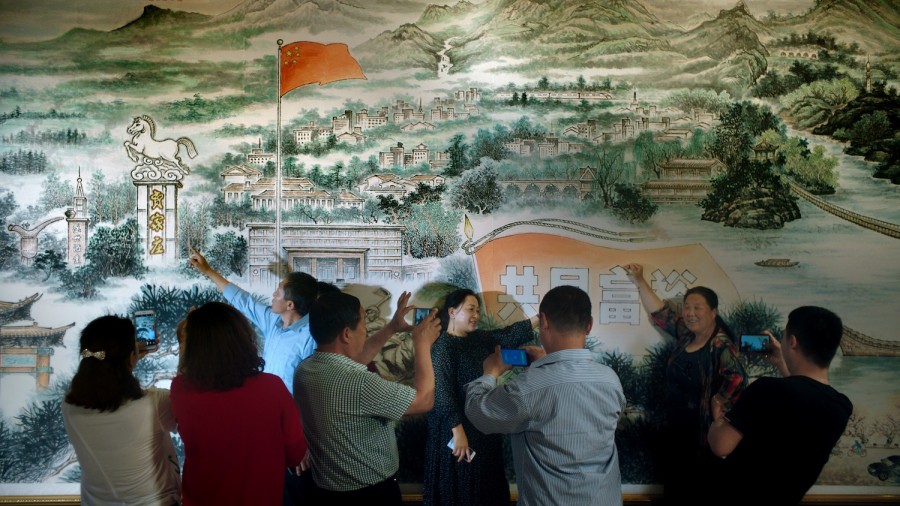Q&A: Chinese filmmaker Jia Zhangke on China’s changing identity
WSN spoke with celebrated Chinese filmmaker Jia Zhangke about nationalism, the internet and capturing contemporary China.
February 20, 2023
Jia Zhangke is often seen as the North Star of Chinese independent cinema. His continued interrogation of the nation’s cultural changes ever since he took up filmmaking in 1997 with “Xiao Wu” — also known as “Pickpocket,” in homage to Robert Bresson — has left behind a corpus of perceptive works which grapple with questions both personal and universal. His films have won multiple awards at renowned film festivals around the globe — Berlin International Film Festival, Cannes Film Festival and the Venice Film Festival among others — yet some of his most acclaimed works remain censored in his home country.
Jia’s latest film, “Swimming Out Till the Sea Turns Blue,” is a documentary that was originally released in 2020, but slowly slipped into the streaming ether due to the ongoing COVID-19 pandemic. It is currently available on Ovid.tv, a relatively new oasis for socially attuned independent cinema. As a documentary, the film stands out from Jia’s usual affinity for fiction-filmmaking; nonetheless, its formalism and interest in political realities both past and present situate it squarely as a Jia film. Following in the footsteps of his previous documentary-portrait of Shanghai’s rapid modernization, “I Wish I Knew,” his latest project sees him embark on a series of interviews with a multi-generational roster of writers based in Shanxi, China about the last 70 years of Chinese history.
This interview was originally conducted in 2020 and has been edited for length and clarity.
WSN: Do you consider yourself a national filmmaker?
Jia: My recent films tend to be positioned in a very long timespan, such as “Mountains May Depart,” which takes place over 20 years, and “Ash is the Purest White,” which spans a similar length. For this particular documentary, “Swimming Out Till the Sea Turns Blue,” you can say that it recounted the history of the past 70 years. It’s not as though I have this vision of becoming a national filmmaker who only makes epic films and those are the only narratives I want to construct. The reason I tend to position my films in such long time-spans and give them the feel of an epic film is because of my rebellious spirit. I am trying to fight against what is going on right now in contemporary China.
Right now in China, you see how internet usage has completely transformed the way in which information is not only transmitted, but also consumed. People have become very fragmented in terms of receiving information. I wanted to rebel against this and create films that take on a long timespan so I could examine issues, connections, structures and historical reasons, informing the fractured information we are receiving and consuming in a holistic and comprehensive way. That’s the reason this documentary has an epic feel to it, it’s a very intentional choice that I made.
WSN: What defines this approach to filmmaking, and what do you gain from deploying it to study present-day China?
Jia: I am very interested in examining the impact of our social environment, our political environment, and our economic environment on the individual. I think these same themes have been explored by a lot of filmmakers around the world in the past decade, but I think many of them tend to focus more on gender issues, identity issues, environmental issues, or other symptoms of modern life whereas I still find examining underlying social, political, and economic structures and the impact they have on individuals of greater interest in all of the films that I have made so far.
WSN: In the chapter titled “Journeys” from “Swimming Out Till the Sea Turns Blue,” there’s a particular emphasis on a scene where people are staring at their phones on the train that suddenly expands into a greater commentary on how digital technologies have become embedded in our everyday landscapes. Are there particular filmmaking practices you favor when it comes to capturing societal changes, particularly those having to do with digital media?
Jia: I do think when it comes to capturing the major transformations and impacts of societal changes — political, economic, technological — on the individual, it is best to capture daily life, that is to say the way we live and we exist now. The here-and-now is just as important as recounting and capturing the past. The chapter you mentioned, “Journeys,” is very much there just to capture that moment of young people consuming digital devices. Capturing how people exist now is an opportunity to question how we got here and start thinking about what happened in the past that brought us here.
It’s very important for a film that is capturing the past to make sure it is rooting it in contemporary life. Instead of structuring the film in terms of memories from the past and the lives that we’re living right now, I explicitly tried to create chapters anchored in words and others without words. The chapters featuring words are about authors talking about what happened in the past. But the ones without words that are just visual sequences are simply observations of daily life that offer opportunities to think about how we’ve moved from a worded past to the non-worded now.
WSN: As a historian of stories — both told and developing — do you consider yourself somebody who prefers telling or listening to stories?
Jia: I really see myself as a listener rather than a storyteller in this particular documentary. When I was conceptualizing this film I knew there were these basic historical structures I wanted to capture and put together, but I didn’t have any details I expected from my interviewees. It’s very much a film of revelations that occur as we’re shooting the film. Those private and personal memories slowly emerge as we’re making the film and that is something that I really enjoy about documentary filmmaking. You never know what you’re going to get, but at the same time that’s how I think about myself as a listener who is attentive to the stories of his subjects. That’s the reason I structured the film in such a way that I position these people in a place where they can share their private memories and stories rather than becoming talking heads and offering commentary. That is not the film I want to make. I want people to actually talk about what actually happened to them within the historical junctures I position them in. Luckily, they were very brave and very generous about their stories and memories, and that’s what you see in the film.
Contact Nicolas Pedrero-Setzer at [email protected].

























































































































































